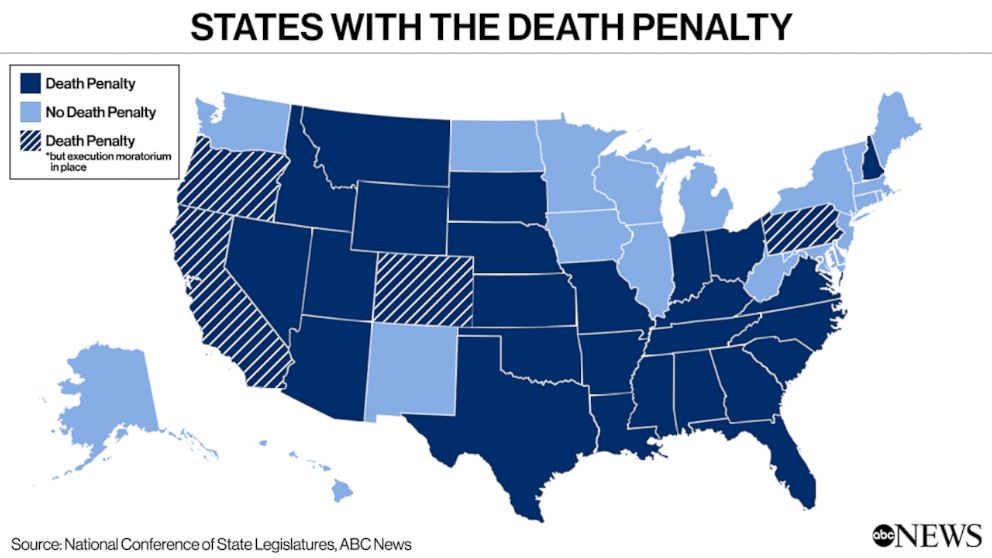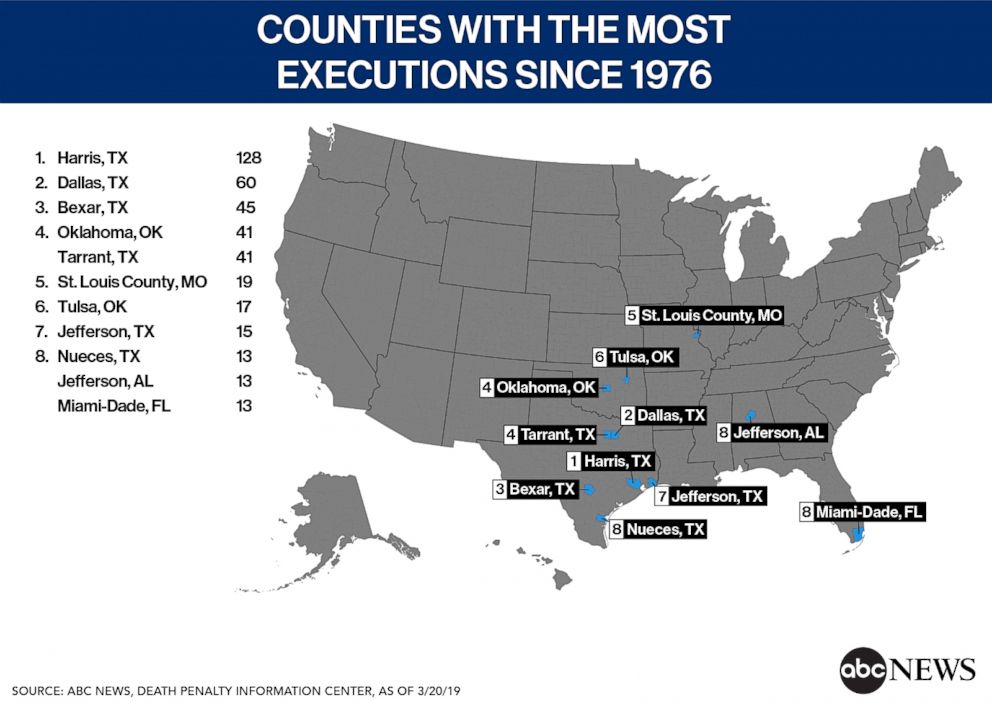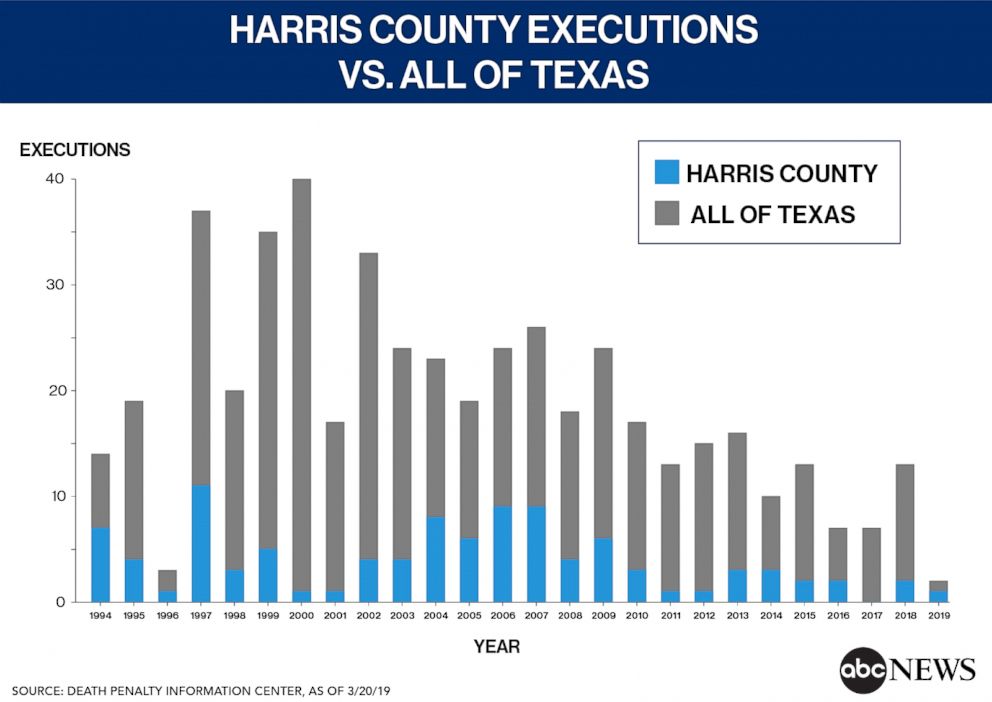4 of the 5 counties with the most death penalty executions are in Texas: Data
While the governor of the country’s most populous state halted death penalty executions, that decision may not have a national impact.
Within two southern states, Texas and Oklahoma, five counties are responsible for one in five executions since the death penalty was reinstated by the Supreme Court in 1976, according to data from the non-profit Death Penalty Information Center (DPIC).
Those counties – Harris, Dallas, Bexar and Tarrant Counties in Texas and in Oklahoma County, Oklahoma – are responsible for 315 out of the 1,493 executions that have taken place in those 43 years.
Prior to California Gov. Gavin Newsom’s moratorium on executions, his state performed 13 executions during the same time frame. Data from the DPIC show there are 11 individual counties across the country that had the same number or more executions themselves during that time period.
"It doesn’t really make sense to talk about the death penalty in the United States. The death penalty is exclusively a Southern phenomenon," said Evan Mandery, a professor at the John Jay College for Criminal Justice.
There are 30 states that have the death penalty in the U.S., though four of those states – now including California – have governors who have issued suspensions on executions.

New Hampshire has the death penalty, but hasn't executed anyone since 1939.
Since the 1976 ruling, there have been 56 executions in Ohio, seven in Utah, four in South Dakota and three in Montana, according to data from the DPIC. By comparison, there were 72 executions in Georgia, 97 executions in Florida, 112 executions in Oklahoma, and 113 executions in Virginia, the data shows.
To date, the largest amount of death penalty executions occurs in Texas, where there have been 560. That represents 37.5 percent of the total 1,493 executions in the United States since 1976.
"Texas is an outlier among outliers," Mandery said.

Mandery said that in spite of its prevalence in certain counties, the death penalty on the whole is "an extraordinarily rare event – many, many things have to go wrong for someone to be executed in the United States."
"No rich white murderer has ever been sentenced to die, so you need to be almost certainly a person of color, probably killed a white person who did it in a state with the death penalty, who did it in a county within that state where the prosecutor aggressively supports the death penalty and where that prosecutor isn’t replaced in office during the time you're on death row by someone who either opposes the death penalty or takes seriously the appellate process," Mandery said.
The role of individual lawyers and prosecutors
There are murderers in every state and crimes committed in every county, but experts suggest that key individuals not connected to the crime itself are the ones, who could ultimately be deciding factors in whether or not a criminal is executed.
Jennifer Laurin, a law professor at the University of Texas at Austin, was the chair of the task force assembled by the American Bar Association that worked on their 2013 assessment on Texas' use of the death penalty. The group’s report found that "the state’s death penalty system falls far short."
Laurin told ABC News that "there are features of Texas's system that we could potentially explain why it is Texas produces so many more death sentences and executions."
One such factor, Laurin said, was that "up until about 1995, Texas had ultimately a sort of notoriously deficient system for providing lawyers to poor defendants including poor defendants facing the death penalty."
"In Texas there was very, very, very low quality of defense lawyering provided at every stage from trial through to execution. Texas has made some significant progress but it remains, as compared to other jurisdictions, a place where the provision of council to individuals facing the death penalty is much less consistent in terms of resources and quality as compared to other states, and across cases in Texas," she said.
Beyond the quality of the defendant’s representation, another factor is how determined the lawyer on the other side of the courtroom was to get a death penalty sentence.
"The death penalty is really driven by individual aggressive prosecutors and there's some sense of it that it almost feels like vigilante justice," Madery said.
That sentiment could be seen by some previously in the Harris County District Attorney’s office – the prosecuting office for the county with the highest number of executions in the country, with 128 deaths.
Patrick McCann, a lawyer in Harris County who has worked on more than 50 death penalty cases, said that "the corporate culture inside the DA's office among the senior people [was that] you were promoted and achieved respect within the office by how many people you sent to death row."
McCann said that one major change came in 2005 when Texas introduced the sentencing option of life in prison without the possibility of parole. According to a Texas Department of Criminal Justice publication, Texas was one of only four states that did not have that sentencing option when they made the switch.
"Since then there's been a gradual decline in the trials they have for death [penalty] in this county, but the prior years means there is still a long line for Harris County folks to get executed,” said McCann.
McCann thinks that the aforementioned culture in a number of key prosecutors’ offices across Texas have “undergone a sea change," including the Harris County District Attorney’s office.

In 2016, Harris County voters, for the first time in nearly four decades, elected a Democratic district attorney. Kim Ogg, who took office in January 2017, was public about how she had previously opposed the death penalty but, came around to allowing it only in the most extreme circumstances.
Ogg told The Houston Observer in June of that year that she doesn't view the death penalty as "a deterrent," saying "it's just pure retribution."
"I’m a human being, and my views have changed before. It’s possible they could change again. But while I ran, I left the death penalty on the table. I said I believed in it at the time. I still do," she told the magazine.
There has been something of a slowdown in the rate of executions in Harris County in recent years, both before and during Ogg’s administration.

In 1997, Harris County executed 11 people, and in the mid-2000s, there were two consecutive years where nine people were executed. But since 2010, there have been three or fewer people executed each year in the county.
"District Attorney Ogg has said that among the most serious actions a government can take is to take a person's life and that the death penalty must only be used for the worst of the worst and most only be done in accordance with the Constitution," Ogg’s spokesman Dane Schiller told ABC News.
"While under Texas law, defendants convicted of capital murder face a penalty of life in prison or death, under this administration, zero defendants have been given death sentences by Harris County juries," Schiller said, though he noted that there was one death sentence issued in 2018, but that case was handled by a special prosecutor after the district attorney’s office was recused over a conflict of interest.
Not overly optimistic
The decrease in executions in Texas may indicate a slow change in attitudes in the state – as well as the qualms that jurors may now have as science advances as well as reporting of wrongful convictions continue – but experts still point to racism at the root of the use of capital punishment as something that would need to be addressed in conjunction with any major changes.
"One idea is that [the use of the death penalty is] tied to the culture of lynching in the South and that the dehumanization of prisoners is an artefact of the commodification of people, and there's clearly something to that," Mandery said.
McCann echoed that – while not unique to Texas – the origin and use of the death penalty are tied to "mostly racism and corruption, but that’s my personal view."
"I think the more difficult problem in every state – and this goes from Pennsylvania and Philadelphia to Houston to Los Angeles – is that we as a people don’t want to acknowledge the vast problems we have in overcoming a legacy of racism that still infects the death penalty," McCann said.
As for Texas specifically, McCann said that capital punishment is "deeply ingrained in the culture here."
McCann said that while the rate of executions "may slow, I don’t see it stopping, short of a national decision by someone like the Supreme Court, that we are simply incapable of doing this properly," he said.
Mandery agreed, and handicapped the odds of such a ruling happening with the current bench of justices unlikely.
"The only mechanism that would end the death penalty in Texas is Supreme Court action. Five years ago, I would have said that was unlikely but possible [that such an action be handed down]. Now it seems quite unlikely," Mandery said.
"The fate of the death penalty rests with the balance of power on the Supreme Court, and that's hanging by a thread," he said.





